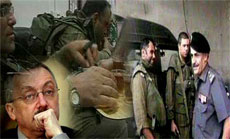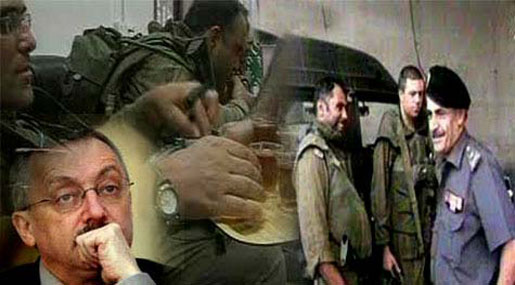
Tea Party with the Enemy at Marjeyoun Barracks!

Fatima Salameh
At about 10:30 am on the morning of August 10, 2006, a phone rang at the office of General Adnan Dawood - Commander of the joint security group in Marjeyoun Barracks.
A soldier answered then told Dawood: "The guards are asking for you."
Dawood talked on the phone, saying: "If they don't get closer, don't talk with them." He then told his visitors that the "Israelis" reached the Barrack's doors.
Two minutes of silence went by, then the phone rang yet again. Dawood answered and said: "What's wrong with you, son?!", then his voice changed and said, "I am General Adnan Dawood". In other words, the person on the other end of the phone was the "Israeli" enemy.
On that day of July, Marjeyoun Barracks had a date with "Israeli" soldiers and generals. On that day, "Israeli" jet planes were soaring through Lebanon's sky, assaulting our children, committing massacres, and terrorizing without any consideration of the simplest moral and humanitarian rules. On that day, citizens of our nation were shaking hands with the enemy, and a white flag was flapping over Marjeyoun Barracks, contrary to all national and patriotic principles.
Matters didn't end here; the Barracks turned into a terrace where tea is hospitably served to the enemy.
Seven years passed since the Marjeyoun Barracks' incident famously known as "The tea scandal". However, these years were not enough to erase former Minister Ahmad Fatfat's shame from history. The man who was the Ministry of Interior was not even ashamed of giving the order to General Dawood to receive the enemy with hospitability.
"If you are not shy, you can do whatever you like." This is what the former head of the Internal Security Forces General Ali al-Hajj phrased the Ahmad Fatfat scandal.
In his view, what happened is an anniversary of national shame. It is an attempt to strike the historical, ethical, and cultural morale.
What happened in Marjeyoun is not merely betrayal, it's much more. According to al-Hajj, it is a profane assault on our history. "It is a violation prosecutable by moral and humanitarian law."

Ferzli further held former PM Fouad Siniora's government back then responsible for the act, because he should've either stood in solidarity or prosecuted the Minster.
"In war, a person should desperately fight to defend one's dignity, and if I were the General Attorney then, I would've prosecuted the perpetrators behind the Marjeyoun scandal," Judge Youssef Saadallah al-Khoury noted when asked about the incident.
From his legal point of view, the events that had occurred are described as dealing with the enemy and a betrayal.
"It is an unacceptable crime and is legally prosecutable," al-Khoury stated.
Article 278 of the Criminal Code stipulates a merciless punishment that "every Lebanese who had offered shelters, food or dress to a spy or to a soldier of enemies' soldiers who works on surveillance, or to a collaborating agent with enemies, or he had contacted one of those spies, or soldiers or agents under the condition of being aware of his identity will be penalized to temporary hard labor".
Moreover, the government that had shed false tears in the July Aggression is not innocent from Fatfat's scandal. Al-Hajj agreed with Ferzli who said, "The authority that harbors this microbe holds responsibility. It ignored and encouraged what was happening in the Barracks. If the government hadn't given the Minister the green light, security officials wouldn't have dared to act in this way that leads to chaos."
Legally-speaking, al-Khoury highlighted the necessity of conducting an investigation and referring it to the judge in charge who will in turn issue an arrest warrant and prosecute the perpetrators as an example to the rest of similar violators.
Furthermore, al-Khoury reassured that the opportunity of prosecution hasn't passed just yet, since trial is withdrawn after at least ten years of its date.
However, al-Khoury asked, "Are there any responsible parties who could act?"
For his part, Ferzli reiterated, "The tea incident is an unforgettable one. Although it was legally forgotten, it is present in politics in its every detail."
"Accountability for Fatfat and his entourage prevented him from being legally prosecuted," General Ali al-Hajj stated. "If there was a government in Siniora's term that differentiated between an enemy and a friend, Fatfat would've been prosecuted by the law. The normal place for this person is jail."
Indeed, if the General Prosecution or the government back then promptly acted, Fatfat would've been in prison now.
In this regards, al-Khoury underscored, "The murderous massacre-committing enemy entering a Lebanese Barracks is a crime. It is surely shameful and is punishable by the law. The legal institution imposes a strict punishment on this note."
Al-Khoury went on and explained the steps to be taken in this case: first, the military man is demoted no matter what the rank is. Then, he is referred to a disciplinary council, where he would be isolated not only suspended, meaning that he is forbidden from the right of compensation and pension, as if he did not occupy his job at all. As for the authoritarian Minister in his tea party, his punishment is both political and punitive; he is punished when the General Prosecution conducts an investigation and tries him in the Supreme Council that prosecutes presidents and ministers.
So, the "Lipton Tea Minister" scandal passed by without punishment by the deaf government of Siniora, since the latter did not find any shame in the Minister's blasphemous act and therefore did not punish him.
That government had sacrificed the nation to conspire on the resistance. Meanwhile, the resistance's people endured war, for they taught the enemy at every day a lesson they would never forget, and they would surely not forget the tea they had in the shameful Barracks.
Source: al-Ahed News, translated by website team



